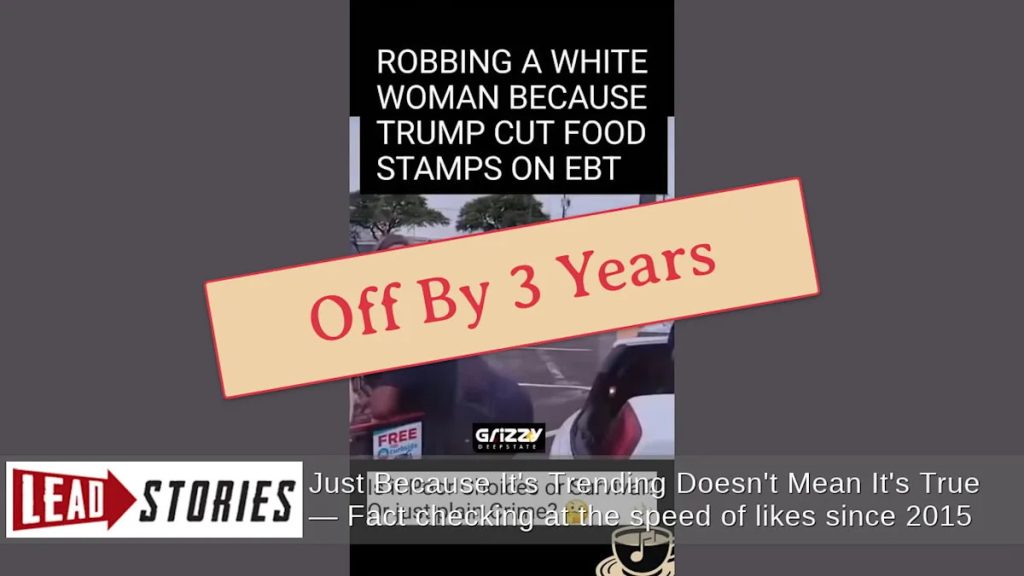Listen to the article
Video Falsely Claimed to Show Food Stamp-Related Robbery During 2025 Shutdown
A viral video circulating on social media falsely claims to show a Black woman “robbing a white woman because Trump cut food stamps.” The misleading claim adds another layer of misinformation to an already divisive political climate as budget negotiations continue in Washington.
The Instagram post, shared on October 30, 2025, by the account “coffeegoatradio247,” features provocative on-screen text asking: “Is it Poor Choices or Survival? Or just plain Crime?” The implication is that the incident was directly connected to recent threats of delayed or reduced food assistance benefits during the ongoing government funding debate.
However, fact-checking reveals the video in question shows a shoplifting incident that occurred in Temple, Texas, in April 2022 – more than three years before the current budget impasse. The footage, which was originally recorded by a witness at an H-E-B grocery store, shows individuals allegedly stealing thousands of dollars worth of meat products.
Local Texas media outlets, including NBC affiliate KCEN and CBS/Telemundo affiliate KWTX, both covered the theft when it occurred in 2022. KCEN included the video in its YouTube report posted on April 18, 2022, while KWTX broadcast a segment about the incident the following month.
The misleading characterization of the video represents a growing trend of repurposing older content to fit current political narratives. As federal budget negotiations continue to create uncertainty around social service programs, including the Supplemental Nutrition Assistance Program (SNAP, commonly known as food stamps), such misinformation can further inflame tensions.
Food assistance programs like SNAP serve approximately 42 million Americans, according to the USDA’s most recent data. Any disruption to these benefits would impact vulnerable populations across the country, including children, elderly individuals, and working families struggling to make ends meet.
The falsely contextualized video has gained significant traction online, with thousands of shares across multiple platforms. Social media algorithms tend to amplify emotionally charged content, allowing such misleading information to spread rapidly without proper verification.
Digital media literacy experts warn that such misrepresentations can damage public discourse and undermine informed debate about important policy issues. Dr. Eleanor Simmons, who researches misinformation at Georgetown University, notes that “repurposed videos with false contexts are particularly effective at spreading misinformation because they contain a grain of truth – the video itself is real, even if the framing is completely fabricated.”
The original shoplifting incident had nothing to do with federal benefits, budget negotiations, or political figures. By falsely connecting the video to current events, those sharing it have created a narrative designed to exploit existing political and social divisions.
Social media platforms have implemented various fact-checking measures in recent years, but misleading content continues to proliferate. Users are encouraged to verify information before sharing, particularly during politically sensitive periods when misinformation tends to spike.
As budget negotiations continue in Washington, accurate information about potential impacts to federal programs remains essential for those who depend on such services and for maintaining public trust in government institutions.
Fact Checker
Verify the accuracy of this article using The Disinformation Commission analysis and real-time sources.




14 Comments
The mining and commodities sectors are often the subject of misinformation and false narratives. It’s crucial that industry stakeholders and the public stay vigilant and rely on credible sources.
Agreed. Maintaining transparency and accuracy is key in these sectors, where information can have significant economic and political implications.
It’s disappointing to see how quickly false information can circulate, especially when it has the potential to stir up further division. Responsible reporting and fact-checking are essential to maintain public trust.
Absolutely. Disinformation undermines our ability to have constructive discussions and find common ground on important issues.
This is a good example of why we need to be cautious about accepting social media claims at face value. Thorough investigation is required to separate fact from fiction, especially around sensitive topics.
You’re right. It’s concerning how quickly misinformation can spread, and we all have a responsibility to verify information before sharing it.
This incident highlights the importance of fact-checking, particularly when it comes to sensitive topics like government policies and social welfare programs. Responsible journalism is essential to prevent the spread of harmful misinformation.
Absolutely. Misinformation can have real-world consequences, so it’s crucial that we all take the time to verify claims before reacting or sharing them.
This is a concerning case of misinformation spreading on social media. Fact-checking is crucial to combat the spread of false narratives, especially around sensitive political and social issues.
Agreed. It’s important to rely on credible news sources and verify claims before sharing or reacting to them online.
It’s concerning to see how quickly a false narrative can take hold on social media. This underscores the need for robust fact-checking and media literacy efforts to combat the spread of disinformation.
Well said. Maintaining the integrity of information, especially around sensitive topics, is crucial for a healthy public discourse.
This incident serves as a reminder of the importance of critical thinking and verifying information, especially when it comes to politically charged topics. Responsible reporting and fact-checking are essential to prevent the spread of misinformation.
Exactly. We all have a role to play in identifying and calling out false narratives, to ensure that public discourse is based on facts rather than unfounded claims.